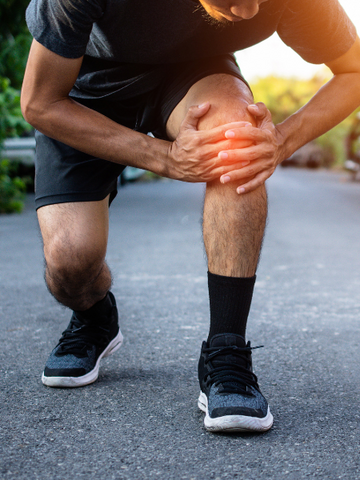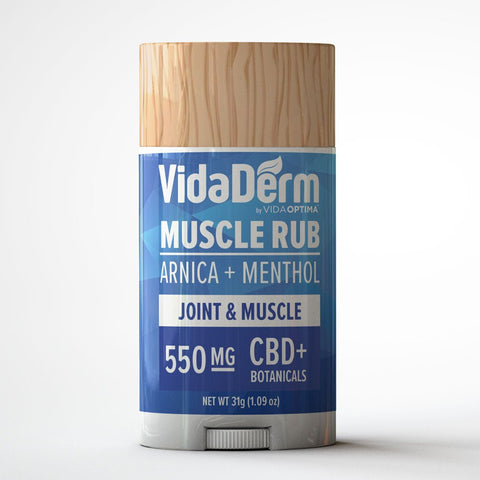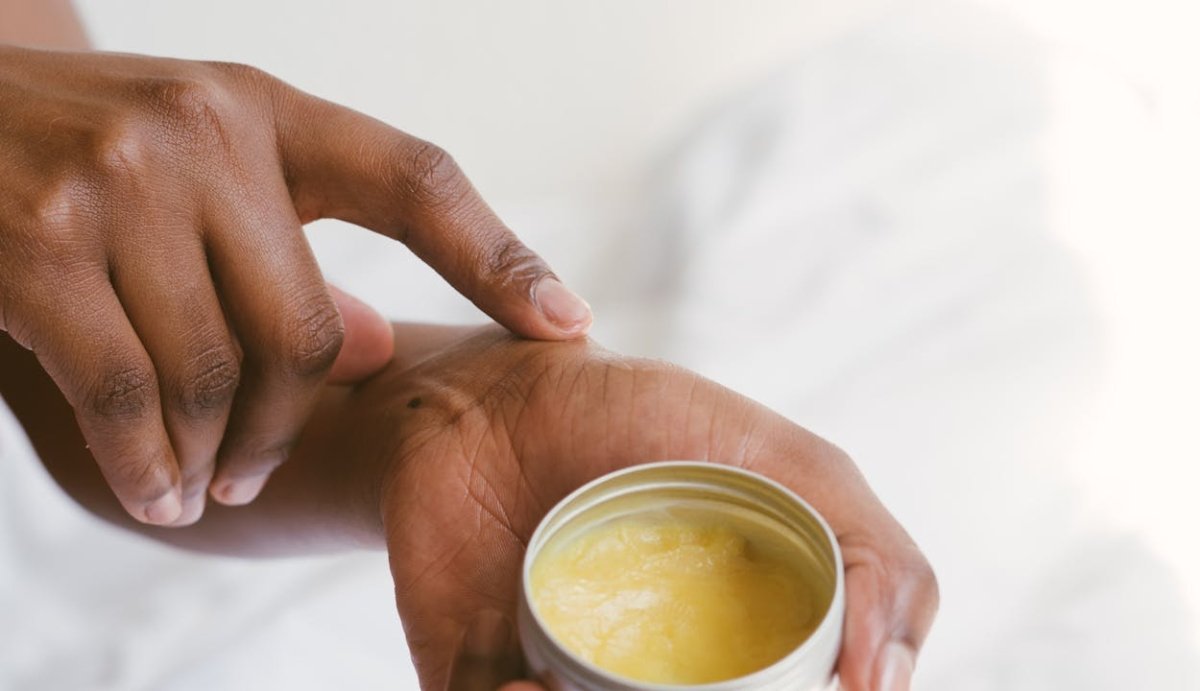Your Cart is Empty
FREE SHIPPING ON ALL ORDERS $75+
Tendonitis, marked by tendon inflammation or irritation, is a common and painful condition, especially among athletes and those with repetitive motion activities. While conventional treatments like rest, ice, and physical therapy are standard, interest in natural inflammation remedies, such as CBD creams, is on the rise.
CBD, derived from cannabis, is renowned for its potential therapeutic effects, notably its anti-inflammatory properties. As CBD gains traction for its purported benefits, many tendonitis sufferers are considering CBD creams. In this article, we'll cover everything you need to know about the best CBD creams for tendonitis, how to use them, and what to expect.
Let’s start with the basics:
Table of Contents
What is Tendonitis & What Causes It?
Potential CBD Benefits for Tendonitis
Which is the Best CBD Cream for Tendonitis?
Does CBD Always Work for Tendonitis?
How to Choose the Right CBD Topical
How to Use CBD Cream for Tendonitis
What to Expect When Using CBD Topicals
Conclusion

Before delving into the potential benefits of CBD creams, it's essential to understand tendonitis and its causes. Tendonitis occurs when tendons become inflamed or irritated, often due to repetitive movements, overuse, or injury. Common symptoms include pain, swelling, and stiffness, which can significantly impact one's quality of life and ability to perform daily activities.
Traditional treatment approaches for tendonitis typically focus on alleviating symptoms and promoting healing. These may include rest, ice therapy, physical therapy, anti-inflammatory medications, and in severe cases, corticosteroid injections or surgery. However, some individuals may seek alternative remedies like CBD creams to complement or replace conventional treatments.
CBD, one of the many cannabinoids found in the cannabis plant, has garnered attention for its potential therapeutic properties, including anti-inflammatory, analgesic (pain-relieving), and muscle-relaxant effects. Research suggests that CBD interacts with the body's endocannabinoid system, which plays a crucial role in regulating various physiological functions, including pain perception and inflammation.
Several studies have investigated the effects of CBD on inflammatory and pain-related conditions, albeit they are limited in scope. For instance, one 2023 study reported a significant improvement in pain levels and pain-related disability in retired athletes who experienced chronic lower extremity pain. Another study from 2015 found that topical CBD reduced pain-related behaviors in rat models with arthritis.
While the results are promising, more research is needed to fully understand CBD's efficacy and safety profile for tendonitis specifically. Nonetheless, anecdotal evidence and preliminary research suggest that CBD may offer relief from tendonitis symptoms, making CBD creams an appealing option for some individuals. To learn more, read “How Do CBD Topicals Work?”

VidaDerm™ CBD Muscle Rub offers targeted relief with its potent blend of organic ingredients. Enhanced with menthol, arnica, and turmeric oil, this full spectrum CBD muscle rub increases circulation, eases tension and swelling, and provides topical anti-inflammatory benefits. Its proprietary blend of essential oils ensures effective relief from acute muscle and joint pain.
Best for:Individuals seeking powerful, natural relief from muscle and joint discomfort. Ideal for those dealing with acute pain or tension, looking for a topical solution that combines the benefits of CBD with organic ingredients for holistic relief.
cbdMD's CBD Freeze Roller offers instant cooling relief infused with the power of Superior Broad Spectrum hemp extract. Formulated with menthol, arnica, tea tree oil, and aloe vera, it targets temporary muscle and joint pain effectively. This fast-drying roll-on is perfect for post-workout recovery or soothing discomfort from daily activities.
Best for:Active individuals seeking fast relief from muscle and joint discomfort after workouts or long days, looking for a gentle yet potent CBD topical solution.
CBD Living Massage & Body Oil offers a luxurious blend of natural oils, including hemp, almond, grape seed, and apricot, enriched with Vitamin E and 300mg of nano CBD. Designed to soothe tired muscles and hydrate dry skin, this non-greasy formula absorbs quickly, leaving behind a nourished, moisturized feeling without the need for rinsing.
Best for:Individuals seeking a premium massage oil that not only relaxes tired muscles but also deeply moisturizes the skin, leaving it feeling rejuvenated and silky smooth. Ideal for professional massages or self-care routines.
CBD's anti-inflammatory properties have led many to explore its potential for alleviating tendonitis symptoms. While some users report significant relief, effectiveness can vary based on individual factors like condition severity and body chemistry.
It's important to note that CBD is not a guaranteed solution for tendonitis and should be used as part of a comprehensive treatment plan. Consulting a healthcare provider before use is advisable, especially if taking medications or having underlying health conditions.

When selecting a CBD cream for tendonitis, several factors should be considered, including the product's potency, ingredients, formulation, and third-party testing for quality and purity. Additionally, it's essential to consult with a healthcare professional, especially if you have underlying medical conditions or are taking medications, to ensure CBD is safe and appropriate for you.
Here are some things to consider:
By considering these factors and consulting with a healthcare professional, you can choose a CBD cream that meets your needs and preferences while ensuring safety and effectiveness in managing tendonitis.
Using CBD cream for tendonitis can provide relief from pain and inflammation, offering a complementary approach to traditional treatments. Here's how to use CBD cream effectively:
Before applying CBD cream, ensure that the skin around the affected tendon is clean and dry. Use mild soap and water to gently wash the area, then pat it dry with a clean towel. Removing any dirt, sweat, or other substances from the skin helps the CBD cream to penetrate effectively.
Dispense a small amount of CBD cream onto your fingertips. Start with a pea-sized amount and gently massage it into the skin over the affected tendon. Avoid applying excessive pressure, as this may exacerbate pain or inflammation.
Use gentle, circular motions to massage the CBD cream into the skin. Focus on the area surrounding the affected tendon, ensuring thorough coverage. Massaging the cream helps to improve circulation and promotes the absorption of CBD into the skin and underlying tissues.
After applying the CBD cream, allow it to fully absorb into the skin before covering the area with clothing or bandages. This typically takes a few minutes, but the absorption rate may vary depending on the individual and the specific CBD cream formulation.
Depending on the severity of your tendonitis symptoms, you may need to reapply CBD cream throughout the day. Follow the manufacturer's recommendations for frequency of use, and listen to your body's signals for pain relief. If you experience any adverse reactions or discomfort, discontinue use and consult with a healthcare professional.
While CBD cream may offer relief from tendonitis symptoms, it is often most effective when used in conjunction with other treatment modalities such as rest, ice therapy, and physical therapy. Consider incorporating CBD cream into a comprehensive tendonitis management plan for optimal results.
You may also look into taking CBD orally, like with a CBD Tincture, to increase its benefits.

Before using CBD cream for tendonitis, it's essential to consult with a healthcare professional, especially if you have underlying medical conditions or are taking medications. They can provide personalized guidance on incorporating CBD into your treatment regimen and ensure it is safe and appropriate for you.
By following these steps and incorporating CBD cream into your tendonitis management routine, you may experience relief from pain and inflammation, allowing you to resume your daily activities with greater comfort and mobility.
Using CBD topicals for tendonitis can offer relief from pain and inflammation, but it's essential to understand what to expect when incorporating these products into your treatment regimen.
By understanding what to expect when using CBD topicals for tendonitis, you can make informed decisions about incorporating these products into your treatment plan. While they can offer relief from pain and inflammation, they may not be a complete solution on their own and may require supplementation with other treatment modalities for optimal results.
In conclusion, CBD creams have emerged as a potential option for managing tendonitis symptoms, thanks to their purported anti-inflammatory and analgesic properties. While research on CBD's efficacy for tendonitis is ongoing, many individuals report positive experiences with CBD creams, finding relief from pain and inflammation. However, it's essential to approach CBD use cautiously, considering individual factors and consulting with a healthcare provider.
If you’re looking for powerful CBD Topicals, take a peek at our VidaDerm Collection. Or check out our Vitality CBD Collection for a variety of CBD products made for daily life.

Comments will be approved before showing up.



